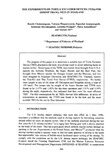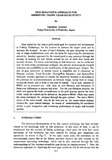Browsing Proceedings of the Regional Workshop on Responsible Fishing, Bangkok, Thailand, 24-27 June 1997 by Issue Date
Now showing items 1-20 of 33
-
Study on Turtle Excluder and By-catch Reduction Devices in the Philippines
(Training Department, Southeast Asian Fisheries Development Center, 1997)Experimental test-fishing of different TED types, namely : modified Thai Turtle Free Device (TTFD), Super Shooter (SS) and Hooped TED were conducted for eight (8) fishing days in March and April 1997 in Manila Bay. Assessment ... -
The Experiments on Turtle Excluder Devices (TEDs) for Shrimp Trawl Nets in Thailand
(Training Department, Southeast Asian Fisheries Development Center, 1997)The purpose of this paper is to determine a suitable type of Turtle Excluder Device (TED) attached to the body of a shrimp trawl to avoid inflicting harm on marine turtles. Seven types of the TEDs were tested; three brought ... -
Application of the Australian Trawl Efficiency Device in Australia s Northern Prawn Fishery
(Training Department, Southeast Asian Fisheries Development Center, 1997)The following paper is made up of three field trip reports covering the testing and commercial use of the Australia Trawl Efficiency Device (AusTED). The work was carried out in the Northern Prawn Fishery (NPF) aboard five ... -
Moving towards more Responsible Fishing Practices in Australia s Northern Prawn Fishery
(Training Department, Southeast Asian Fisheries Development Center, 1997)Bycatch in Australia s Northern Prawn Fishery (NPF) is extremely diverse in both species and size composition. This makes developing responsible fishing practices to reduce the amount of bycatch in the NPF, a complex ... -
Southeast United States Fisheries Bycatch Reduction Research in Shrimp Trawl Fisheries
(Training Department, Southeast Asian Fisheries Development Center, 1997)Presented in the paper are the two devices that were developed by some states in the southeast United States to reduce fisheries bycatch in shrimp trawls. These were Turtle Excluder Device (TED) and Bycatch Reduction Device ... -
Cooperative Research Networking to Facilitate Research and Development for the Reduction of Wastage in Shrimp Fisheries
(Training Department, Southeast Asian Fisheries Development Center, 1997)Because of the importance of shrimp trawling fisheries in a number of countries in Asia and the Indian Ocean region and recommendations for more research work in the field of selectivity, in particular through more cooperation ... -
Status of Fishing Conditions in Cambodia
(Training Department, Southeast Asian Fisheries Development Center, 1997)Fisheries in plays a very important role in Cambodia’s national economic development. Total fish catch production in 1996 was 104 310 tones, about which 60% was contributed by inland capture fisheries, 30% by marine capture ... -
Fishing Status of Thailand
(Training Department, Southeast Asian Fisheries Development Center, 1997)Marine fishery of Thailand characterized as multi-species and multi-gear fishery. The continuous advances in fishing technology make marine production increasing annually that resulted in depletion of the stocks particularly ... -
Training and Extension on Selective Fishing in the Philippines
(Training Department, Southeast Asian Fisheries Development Center, 1997)Effective conservation and management of the Philippine fishery and aquatic resources must be given due considerations. The Code of Conduct for Responsible Fisheries specifically on Article 7, Section 7.1.1 on Fisheries ... -
Fish Behaviour Approach for Improving Trawl Gear Selectivity
(Training Department, Southeast Asian Fisheries Development Center, 1997)Gear selectivity has been a gold-medal goal for research and development in Fishing Technology, for the purpose to increase the target catch and to decrease the bycatch. In case of trawl fisheries, the gear designing by ... -
Training and Extension Program on Responsible Fishing in Indonesia
(Training Department, Southeast Asian Fisheries Development Center, 1997)Series of research and seminars were currently carried out in Indonesia to build sufficient scientific evidences in formulating national policy on Responsible Fishing. With those activities, it is expected that suitable ... -
Proceeding of the Regional Workshop on Responsible Fishing
(Training Department, Southeast Asian Fisheries Development Center, 1997)The deterioration in fisheries resources is a fact faced by the world fishing industry and the consumer alike. The need for Responsible Fisheries management has never been as great as it is now, not in any one country in ... -
Inmarsat's Role in Responsible Fishing
(Training Department, Southeast Asian Fisheries Development Center, 1997)The paper documents the the application of the services of International Maritime Satellite Organization (Inmarsat) to responsible fisheries. Currently known as International Mobile Satellite Organization, offers an ... -
Status of Fisheries in Union of Myanmar
(Training Department, Southeast Asian Fisheries Development Center, 1997)Presented in the paper is the status of fisheries in the Union of Myanmar for the period 1996-1997. Discussed are the fishery production, and trade of the country, including its fishery policies. -
Strategy for the Implementation of the Code of Conduct for Responsible Fisheries
(Training Department, Southeast Asian Fisheries Development Center, 1997)This paper presents the strategy for the implementation of the Code of Conduct for Responsible Fisheries (CCRF). CCRF was adopted by the Twenty-eighth Session of the FAO Conference in October 1995. It is of a voluntary ... -
Status of Fishing Conditions in Japan in Relation to Responsible Fisheries
(Training Department, Southeast Asian Fisheries Development Center, 1997)The presence of a large number of species that are low in quantity in Japan's coastal waters has resulted in the evolution of a food culture that has historically utilized most of the catch species and sizes that are caught ... -
Cooperative Research in Asian Fisheries-future Directions and Opportunities
(Training Department, Southeast Asian Fisheries Development Center, 1997)The fisheries of many countries in Asia are heavily reliant upon fisheries as a major source of food protein with fish consumption levels two to three times higher than those of western countries and collectively, the ... -
Discards in Japanese Marine Capture Fisheries and their Estimation
(Training Department, Southeast Asian Fisheries Development Center, 1997)By catch focused here is incidental catch to be discarded at sea and those utilised is dealt little. This is because, as widely stated, by catch is not necessarily a negative practice as there are many fisheries which are ... -
Department of Fisheries Malaysia: Training and Extension Programs
(Training Department, Southeast Asian Fisheries Development Center, 1997)Presented in the paper are the training and extension programs of the Department of Fisheries Malaysia. The most common and important issues facing the marine capture fishery, such as overfishing, competition between ... -
Training and Extension Programs on Responsible Fishing in Thailand
(Training Department, Southeast Asian Fisheries Development Center, 1997)The marine fisheries status has declined in stock and become very critical issue at present. Fisheries regulations and notifications have been issued for solving the problems of fisheries management. Responsible fishing ...




















